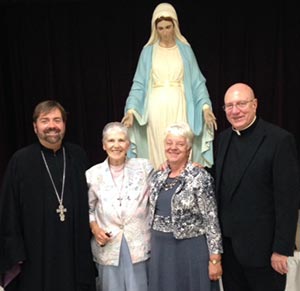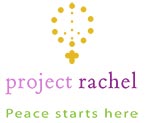In 1963, Pat Morris made a choice that changed her life forever. Though she was Catholic, she was living a self-described “bad lifestyle.” She became pregnant and had an abortion.  Fr. Rick Rohrer, who oversees Project Rachel in the Diocese of Raleigh, North Carolina, left to right, Pat Morris, Vicki Thorn and Fr. Ken Metz, pose for a photo at Project Rachel’s 30th anniversary celebration Sept. 19 at St. Margaret Mary Parish, Milwaukee. Thorn is founder and executive director of Project Rachel. (Submitted photo courtesy Vicki Thorn)
Fr. Rick Rohrer, who oversees Project Rachel in the Diocese of Raleigh, North Carolina, left to right, Pat Morris, Vicki Thorn and Fr. Ken Metz, pose for a photo at Project Rachel’s 30th anniversary celebration Sept. 19 at St. Margaret Mary Parish, Milwaukee. Thorn is founder and executive director of Project Rachel. (Submitted photo courtesy Vicki Thorn)
Because abortion was not legal, she was sent on a circuitous and secret route not to a back alley, but to a Chicago penthouse, where the abortionist and a formidable man were the only other people in the room.
“The penthouse was stripped of all furniture except for the table,” she said. “It was by God’s mercy that I didn’t disappear because I didn’t even know where I was. They had a car pick me up, and we had to make phone calls along the way to get the directions. If I hadn’t survived, they would have gotten rid of me.”
Already the mother of a 4-year-old daughter, Morris left her with her neighbor, the only person who knew what was going on, while she underwent the abortion.
“I was 14-weeks along and I thought that abortion was the only answer because one of the guys I was with told me to have it done or the authorities would take my daughter away since I was not sure who the father was,” she said. “After the procedure, all I can remember was that I was relieved it was over and I thought I was done.”
Depression followed loss of babies
Morris went on to miscarry six babies before finally delivering her son. For nine years, she struggled with the consequences of her lifestyle choices as well as deep depression from the loss of seven unborn babies. There was a split between what she thought and what she felt. She stopped going to Mass because she knew she was living contrary to church teaching, but she was still drawn to the faith of her youth. Until she sought help, she never associated her problems with the terminated pregnancy. Much later, she realized she was suffering from post-abortion syndrome.

In 1973, she visited her sister in Orlando, Florida, who asked her to attend a prayer meeting.
“I started going to this group of 125 people, and continued after my sister left,” she said. “I went to confession and after I came out, I thought that maybe God forgave me, but I didn’t really think so.”
In the early 1980s Morris attended confession and a healing service in Antioch, Illinois, where her life changed dramatically. She began volunteering with pro-life ministries and doing sidewalk counseling outside abortion clinics to share her story and try to help other women faced with unwanted pregnancy and post-abortion issues.
Never felt forgiven
“Eventually, I shared my testimony with priests where I was part of a panel dealing with post abortion, and told them how I felt when I didn’t think I was forgiven,” she said. “Post-abortion trauma not dealt with is like an unburied body in the house. At one point, the priests began sharing with me that they were hearing women giving their abortion confessions again and again, also never feeling as if they were forgiven. The Lord had given me a healing and more came later in the naming of my unborn children.”
Morris, who now resides in San Diego, met Vicki Thorn, founder and executive director of Project Rachel, while both served on the Respect Life panel. Shortly after the panel, Thorn founded Project Rachel to help deal with the aftermath of abortion. Project Rachel recently marked its 30th anniversary with Mass and a dinner, where Morris spoke.
Some women become suicidal
“I don’t know what we would do without Project Rachel, but I would imagine it would be like it was in the ’60s when there wasn’t any help. Even if you told a friend what happened, (she) would not be able to help,” said Morris. “A lot of women are suicidal after abortion and this ministry helps women through those feelings. Now, because of Vicki, priests know how to help a woman or a man deal with their wounded hearts. I think Project Rachel has also had an impact on young people in helping them not to go that route, and they are international now. I marvel at Vicki. She is simple, humble and has made a huge difference in the world. She is amazing.”
Organization offers women hope, forgiveness
Senior Milwaukee archdiocesan priest, Fr. Kenneth Metz, lives in Sanford, Florida, and assists at All Saints Parish; he remembers that in the beginning, Project Rachel focused on the role of the priest in terms of the sacramentality of penance.
“We integrated that with prayer for healing, and also talked to priests in different dioceses about this,” he explained. “Vicki and I had talked for months before Project Rachel came to pass, and she came to my office in the Cousins Center 30 years ago last August. She was praying more and felt that now was the time to move forward. So, I got a hold of Fr. Bob Faricy, (Jesuit priest and theologian from Marquette) to help us. It all fell into place and was a move of the Spirit to help the church work in this situation.”
Offering post-abortive women and men hope and bringing God’s mercy to the people is what the priestly vocation is all about, explained Fr. Metz, who also spoke at the anniversary dinner and concelebrated the Mass.
“This is one thing that Pope Francis has been saying again and again, to show the mercy of the Lord,” he said. “The role of the priest is always to proclaim that; of course, a priest has to make a judgment that what was done is wrong, but God’s mercy comes when the repentant person enters into the situation.”
Post abortion trauma affects men, too
It may be surprising to some, but Fr. Metz explained that post-abortion trauma also affects men and the pain can be intense.
“If you knew you were a father and your child is no longer alive, it has to have an impact, even if they said they paid for it, they had a hand in the abortion and need forgiveness and mercy just as the woman involved,” he said. “In the past, we considered there to be two victims, the child and the mother, but we have come to realize that the baby’s father is also very much affected. If a father had a part to play in that, there was a connection with the child. That is his baby. His genes are in there too.”
When women or men come to him for confession or counsel after abortion, Fr. Metz said it is important to realize they have come asking for the Lord’s mercy, and are aware that somebody lost their life.
“The good part of being a priest is that we can assure the person of forgiveness,” he said. “There are two issues really, one is feeling that we can be forgiven, and if not, where is that coming from? It is a sense of guilt and the realization that there is a part of them that is not healed. That healing, then, is what goes on inside the person, the time that the mother or father can accept the fact that they have been forgiven and make peace. My experience is that the healing of the Lord comes in and they go away feeling better.”
Numbers worldwide are staggering
While Project Rachel is in 25 countries and 165 dioceses in the United States, Thorn wants to provide care to women in other underserved countries.
“In Africa and Latin America, getting help for poor women is difficult in that there are no mental health centers on every corner,” she said. “We have priests, so that is good as this is a sacramental ministry, but we need ongoing, supportive care to help these women.”
The aftermath of abortion spans the globe, but the impact hit Thorn hard when she traveled to Romania and learned from doctors and seminarians about a woman who had 70 abortions.
“I just couldn’t imagine it, couldn’t wrap my mind around it, but then a woman doctor told me that there are others with a similar number. I also learned that the average number of abortions a woman has is nine in Russia,” said Vicki. “It really made me wonder how many really are there? As a church, we need to deal with this. The need is extremely enormous.”
Pregnancy alters a woman’s identity. No longer a child, she becomes a mother, and if the pregnancy is lost through abortion or miscarriage, it leaves a large hole, chemically and psychologically.
Walking wounded don’t know where to turn
“The thing about Project Rachel is that it is part of the New Evangelization and there are so many walking wounded who don’t know where to turn,” she said. “A woman who has lost a child to abortion or miscarriage carries the cells of those children in their bodies and they cannot get rid of them. It is a soul wound – not just a psychological wound — and many women also believe that this is an unforgivable sin.”
In Japan, which has had legal abortion since the 1950s, Buddhist temples have special mourning rites for women who have aborted.
“It is similar in Taiwan where abortion is also commonplace and their custom believes that abortion ends the cycle of reincarnation. The locals try to appease the spirits by burning money, clothing and food so that those who are aborted can continue the journey of reincarnation.” said Thorn. “They have baby spirit services that include naming the child and lighting incense. In order to grieve what has been lost, you need to recognize what is lost. No matter the ritual, the wounds of the parents look the same.”
When she visited China, Thorn met several rural religious sisters who had performed abortions as midwives because they did not know abortion is morally wrong.
“We have to remember that they were part of an underground church and we can’t assume there was proper formation,” she said. “That was so sad.”
Beginning a Project Rachel ministry in Poland is important to Thorn because it was something dear to the heart of Pope John Paul II when he first wrote about it in “Love and Responsibility.”
